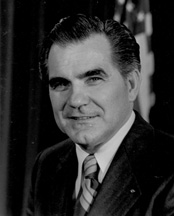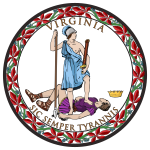
The 1972 United States Senate elections coincided with the landslide re-election of Republican President Richard Nixon. Despite Nixon's landslide victory, Democrats increased their majority by two seats. After the elections, Democrats held 56 seats, and Republicans held 42 seats, with 1 Conservative and 1 independent senator. These were the first elections in which all citizens at least 18 years of age could vote, due to the 1971 passage of the 26th Amendment.

The 2000 United States House of Representatives elections on November 7, 2000 coincided with the election of George W. Bush as President of the United States. The Republican Party won 221 seats, while the Democratic Party won 212 and independents won two. Although there was minor seat change, this year was the highest percentage for the Libertarian Party in The House of Representatives and the last time that independents gained a seat.

The 1972 United States House of Representatives elections coincided with the landslide reelection victory of President Richard M. Nixon. Nixon's Republican Party managed to gain a net of twelve House of Representatives seats from the Democratic Party, although the Democrats retained a majority.

The 2006 United States Senate election in West Virginia was held November 7, 2006. Incumbent Democrat Robert Byrd won re-election to a ninth term. He was sworn in on January 4, 2007. However, he died in office on June 28, 2010, before the end of his term. This was Byrd's closest re-election.

The 2008 United States Senate election in West Virginia was held on November 4. Incumbent Democratic U.S. Senator Jay Rockefeller won re-election to a fifth term, defeating Republican Jay Wolfe. As of 2022, this is the last time that a Democrat has won West Virginia's Class 2 U.S. Senate seat.

The United States House of Representatives elections in California, 1972 was an election for California's delegation to the United States House of Representatives, which occurred as part of the general election of the House of Representatives on November 7, 1972. California gained 5 seats as a result of the 1970 Census, three of which were won by Democrats and two by Republicans. Of California's existing House seats, none switched parties.

The 2000 United States House of Representatives elections in Virginia were held on November 7, 2000 to determine who will represent the Commonwealth of Virginia in the United States House of Representatives. Virginia has eleven seats in the House, apportioned according to the 1990 United States Census. Representatives are elected for two-year terms.

The 1922 United States House of Representatives elections in Virginia were held on November 7, 1922 to determine who will represent the Commonwealth of Virginia in the United States House of Representatives. Virginia had ten seats in the House, apportioned according to the 1920 United States Census. Representatives are elected for two-year terms.

The 1944 United States House of Representatives elections in Virginia were held on November 7, 1944 to determine who will represent the Commonwealth of Virginia in the United States House of Representatives. Virginia had nine seats in the House, apportioned according to the 1940 United States Census. Representatives are elected for two-year terms.

The 1946 United States House of Representatives elections in Virginia were held on November 5, 1946 to determine who will represent the Commonwealth of Virginia in the United States House of Representatives. Virginia had nine seats in the House, apportioned according to the 1940 United States Census. Representatives are elected for two-year terms.

The 1950 United States House of Representatives elections in Virginia were held on November 7, 1950 to determine who will represent the Commonwealth of Virginia in the United States House of Representatives. Virginia had nine seats in the House, apportioned according to the 1940 United States Census. Representatives are elected for two-year terms.

The 1978 United States Senate election in Virginia was held on November 7, 1978. Incumbent Republican Senator William L. Scott did not run for re-election to a second term. Republican former Secretary of the Navy John Warner narrowly defeated Democratic Attorney General of Virginia Andrew P. Miller to succeed him. Originally, this election was a match between Republican Richard Obenshain and Miller, then Obenshain died in a plane crash, leaving the party in disarray. Warner was then nominated to run in Obenshain's place, and his victorious election thrust him into a thirty-year career in the United States Senate, which started with this election.

The 1972 United States Senate election in Virginia was held on November 7, 1972. Republican U.S. Representative William L. Scott defeated incumbent Democratic Senator William Spong, Jr. Scott was the first Republican U.S. Senator from Virginia to be elected in over a century, as the most recent Republican Senator was John F. Lewis, who had held the seat during the Reconstruction era. This is the last time a candidate not named Warner won this seat.

The 1978 United States House of Representatives elections in Virginia were held on November 7, 1978 to determine who will represent the Commonwealth of Virginia in the United States House of Representatives. Virginia had ten seats in the House, apportioned according to the 1970 United States Census. Representatives are elected for two-year terms.

The 1964 United States House of Representatives elections in Virginia were held on November 3, 1964 to determine who will represent the Commonwealth of Virginia in the United States House of Representatives. Virginia had ten seats in the House, apportioned according to the 1960 United States Census. Representatives are elected for two-year terms.

The 1972 United States presidential election in Virginia took place on November 7, 1972. All 50 states and the District of Columbia were part of the 1972 United States presidential election. Virginia voters chose 12 electors to the Electoral College, which selected the president and vice president of the United States. This was also the first presidential election after the passage of the Twenty-sixth Amendment, which decreased the voting age from 21 to 18.

The 1940 United States House of Representatives elections in Virginia were held on November 5, 1940 to determine who will represent the Commonwealth of Virginia in the United States House of Representatives. Virginia had nine seats in the House, apportioned according to the 1930 United States Census. Representatives are elected for two-year terms.

The 1934 United States House of Representatives elections in Virginia were held on November 6, 1934 to determine who will represent the Commonwealth of Virginia in the United States House of Representatives. Virginia had nine seats in the House, apportioned according to the 1930 United States Census. Representatives are elected for two-year terms. This election was notable for the state's return to electoral district voting after briefly experimenting with electing all Representatives at-large in the previous election.

The 1972 United States presidential election in West Virginia took place on November 7, 1972, as part of the 1972 United States presidential election. West Virginia voters chose six representatives, or electors, to the Electoral College, who voted for president and vice president.










